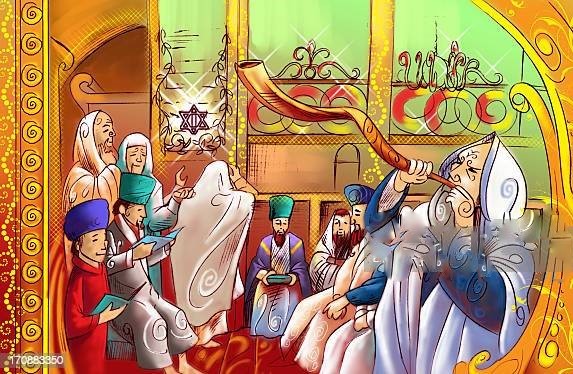 SATURDAY PRAYER: BINAH-YESHIVAT HAVERIM יְשִׁיבָה חברים – BABYLONIAN TALMUD p173
SATURDAY PRAYER: BINAH-YESHIVAT HAVERIM יְשִׁיבָה חברים – BABYLONIAN TALMUD p173

READING: BETWEEN MIDNIGHT AND DAWN OF SATURDAY
“If one deposited a basket of fruit,” etc. Said Hyzkiyah: The case in question treats only of a
basket filled with cucumbers and beets, but if full of mustard seeds he is culpable. From this we
see that Hyzkiyah considers a vessel no support 1 (i.e., the cucumbers are encircled by the basket
and need no support), but the mustard seeds, which are heaped up, are outside of the basket
proper and not supported by it; therefore, when the basket with mustard seeds is carried outside,
part of the mustard seeds are already on the outside and the carrier is culpable. R. Johanan,
however, says, even if the basket contained mustard seeds, he is also not culpable. Thence we
see that R. Johanan does consider a vessel a support. Said R. Zera: “How is it with the Mishna?
It is neither of the opinion of Hyzkiyah nor of R. Johanan.” Hyzkiyah may explain it in
accordance with his theory and R. Johanan with his own. Hyzkiyah explains the Mishna, which
said “unless he carries out the entire basket.” This is the case if the basket is filled with
cucumbers and beets, but if filled with mustard seeds it is equal to putting out the entire basket
into the street, and he is culpable, but R. Johanan explained the Mishna thus: Although the bulk
of the fruit is on the outside, or even if all the fruit were on the outside, the man would not be
culpable unless the entire basket was put on the outside. So also said Rabha: The Mishna treats
only of a basket filled with cucumbers and beets, but if filled with mustard seeds the man is
culpable. Whence we see that he does not consider a vessel a support. Abayi, however, said:
Even if the basket contained mustard seeds, the man is also not culpable. Whence we see that he
does consider a vessel a support. Shall we say that Abayi adopted the system of Rabha and
Rabha of Abayi, or Abayi contradicts himself and Rabha does the same? As it was taught: One
who carried out fruit into public ground, Abayi said, is culpable only if he carried it out with his
hand (although the body remained in public ground), but if in a vessel he is not culpable. (Why?
Because Abayi does not consider the body a support to the hand, in spite of the fact that the
hand is attached to the body, but if he carried out the fruit in a vessel and part of the vessel still
remained in private ground, he is not culpable.) And Rabha says, on the contrary: If he carried
the fruit out in his hand he is not culpable (because he considers the body a support and the hand
is part of the body), but if he carried it out in a vessel he is culpable (because, although the
vessel is still in private ground, some of the fruit is in public ground). The answer is: Reverse
the case. (Say Abayi’s statement should be Rabha’s and Rabha’s Abayi’s).
 HALF REDUCTION OF FLOW IN THE INNER LEFT COURT FOR GREATER DISCLOSURE OF THE UPPER FORCE
HALF REDUCTION OF FLOW IN THE INNER LEFT COURT FOR GREATER DISCLOSURE OF THE UPPER FORCE WEDNESDAY PRAYER: KETER-SHACHARIT שַחֲרִית MORNING PRAYER
WEDNESDAY PRAYER: KETER-SHACHARIT שַחֲרִית MORNING PRAYER WEDNESDAY PRAYER: KETER-TIKKUN CHATZOT תקון חצות-TIKKUN RACHEL & TIKKUN LEAH
WEDNESDAY PRAYER: KETER-TIKKUN CHATZOT תקון חצות-TIKKUN RACHEL & TIKKUN LEAH